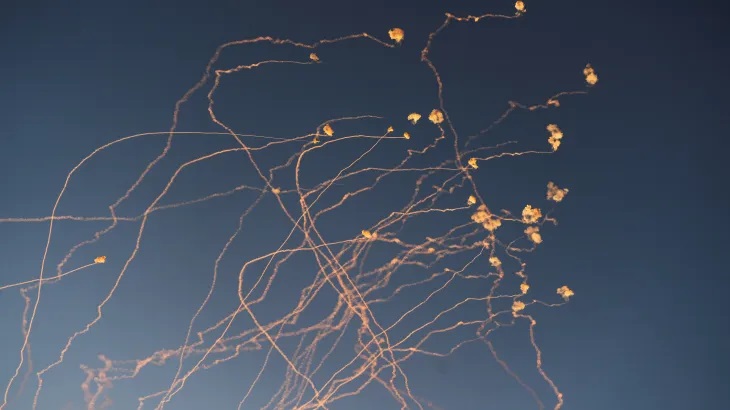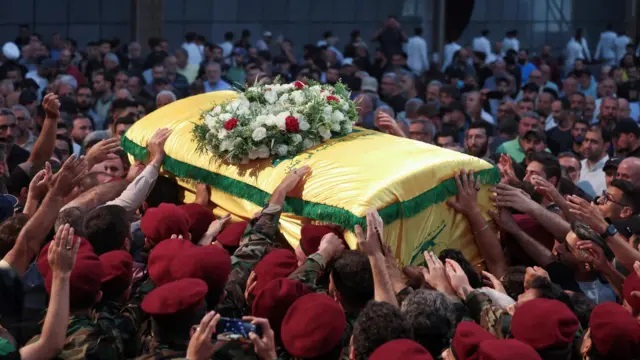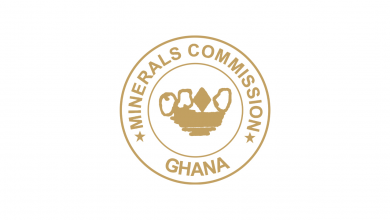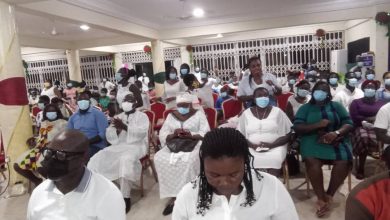Hezbollah launches rockets into northern Israel in retaliation for commander’s killing

The Lebanese armed group Hezbollah launched over 200 rockets and attack drones into northern Israel, responding to the killing of a senior commander.
Israel’s military reported that an officer was killed in the barrage, which also ignited several fires.
In retaliation, the Israeli military targeted Hezbollah “military structures” and other locations in southern Lebanon.
Lebanese media reported that an Israeli drone strike in the town of Houla resulted in one death.
This latest barrage, which followed a 100-rocket attack on Wednesday afternoon, marks one of the most significant escalations in the nine months of cross-border violence, raising concerns of an all-out war.
The Hezbollah commander, Mohammed Nimah Nasser, was killed in an Israeli air strike near Tyre.
Nasser, who commanded Hezbollah’s Aziz Unit responsible for launching rockets from southwestern Lebanon, was accused by Israel of directing numerous terror attacks.
He was considered a senior figure, comparable to Taleb Sami Abdullah, another commander whose death last month triggered Hezbollah to launch over 200 rockets and missiles into northern Israel in one day.
Since the conflict between Israel and Hamas in Gaza began on October 7, there have been almost daily exchanges of fire across the Israel-Lebanon border.
Hezbollah has declared its actions as support for Hamas, with both groups receiving backing from Iran.
They are designated as terrorist organizations by Israel, the UK, and other countries.
More than 400 people, mostly Hezbollah fighters, have been reported killed in Lebanon, while in Israel, 25 people, primarily soldiers, have died.
Israeli Prime Minister Benjamin Netanyahu vowed to restore security in northern Israel, stating, “In the tough campaign against Lebanon we have set a principle – whoever harms us is a dead man. We are making that a reality in practice.”
The hostilities have displaced tens of thousands of people from border areas in both northern Israel and southern Lebanon.

At the funeral of Nasser, senior Hezbollah official Hashem Safieddine warned of continued retaliation, saying, “The response to the assassination of the dear leader Hajj Abu Nimah [Nasser]… started last night and quickly.
This series will continue to target new sites that the enemy did not imagine would be hit.”
UN peacekeeping force spokeswoman Kandice Ardiel expressed concern over the deeper exchanges into both sides of the border, calling for restraint from both Israel and Hezbollah.
“We’re very concerned… because any exchange, any incident, can escalate into something greater if there is a misunderstanding,” she said.
Diplomatic efforts to de-escalate tensions have intensified, with warnings from the UN and the US about the catastrophic consequences of a potential war involving Iran and other allied groups.
Israeli officials have indicated their readiness for war if diplomacy fails. Defence Minister Yoav Gallant stated that the military would soon be ready to “take any action required in Lebanon, or to reach an arrangement from a position of strength.”
Meanwhile, Hezbollah has indicated that it does not seek a full-scale war but warned that it would fight “without rules” if such a war were to occur.
Source-BBC





